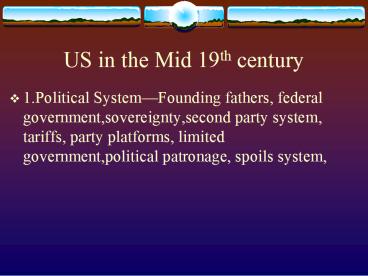US in the Mid 19th century - PowerPoint PPT Presentation
1 / 14
Title:
US in the Mid 19th century
Description:
1.Political System Founding fathers, federal government,sovereignty,second party ... encourage slaves to go back to Africa-1822 US purchased Liberia-limited success. ... – PowerPoint PPT presentation
Number of Views:190
Avg rating:3.0/5.0
Title: US in the Mid 19th century
1
US in the Mid 19th century
- 1.Political SystemFounding fathers, federal
government,sovereignty,second party system,
tariffs, party platforms, limited
government,political patronage, spoils system,
2
US in the mid 19th century
- 2.Economic system-American dream, womens status,
cult of domesticity, abolitionism, temperance,
people of plenty, - Demographic issues, western expansion,
agriculture,transport,industrialization,
urbanization
3
US in the Mid 19th century
- 3.Sectionalism- What were the main differences
between the north and the south? - -US never particularly united, some similarities
(language, religion,legal system,celebration of
the same history etc) - -differences economic-civil war as a conflict
between backward, planter dominated agrarian
south and modern industrialized, egalitarian
north.Was Texas the dame as Virginia?
4
- Sectionalism (cont) Many northssome agriculture,
some newly industrialized etc. - Was the south economically backward? Cotton ½
all US exports, Iron works in Richmond 4th in
nation. Egalitarian north? 10 of popn owned 68
of wealthalmost exactly the same in the south.
75 of southerners did not own slaves in 1860.
5
US in Mid 19th century
- 3. Sectionalism Planters (5 of popnown 20 or
more slaves) best land, Eugene Genovese says set
the tone for southern life, dominated
politicsreactionary? Fluidity in southern
societysome Whigs, some democrats - North-south differences Industry,urbanization,
immigrants,economic grievances (tariffs benefit
north,depend on northern credit, needed northern
transport, King Cotton profits go north.)
Southern honor (anti-materialism,
anti-urbanization,gracious ways of life)
Historian Wyatt Brown southerners highly
susceptible to insult,more concerned with family
e.g duelling.
6
US in Mid 19th century
- Sectionalism-values education, south more sure
to hold on to old institutions - peculiar institution slavery
7
US in Mid 19th century
- 4. Slavery 17th and 18th century slave trade
from Africa (slave triangle) 1808, illegal, but 1
million slaves in US - Pre 18301776 exists in all colonies, important
in the south for plantation purposes (labor
intensive) Quakers condemn slavery on moral
grounds, others say inconsistent with liberal
enlightenment of liberty. 1787, no slaves in
north west territory - 1793-cotton gin revolutionized production-required
large amounts of unskilled labor- 1787 3/5s
compromise-Haiti revolution 1790 led to tighter
social control.
8
abolitionists
- Begin with gradual emancipation with
compensation, encourage slaves to go back to
Africa-1822 US purchased Liberia-limited
success. - William Lloyd Garrison-radical, The Liberator,
slavery a sin, immediate abolition, idealist 1833
National Anti Slavery Society ¼ million members
1838
9
abolitionists
- Women and freed slaves e.g Fredrick
Douglass-petitions to congress-gag rule. - Why so strong in the north? World wide
phenomenon, religion Catholicism and evangelical
Protestantism (Second great Awakening - Abolitionists problems in the North only limited
appeal (De Tocqueville) some fear for economic
reasons, 1837 riots and Lovejoy murdered, limited
political success-Liberal party set up, disagree
over strategy (incite slave revolts?)
10
abolitionists
- Problems in the south no support after Nat
turner revolt 55 whites killed, begin to argue
that slavery was positive good, Christ did not
condemn slavery, protected by paternalism, banned
abolitionist literature- death penaltysouth
united to protect slavery
11
Nature of slavery
- Very little account, fugitive slaves
- 1860 4 million slaves, 1850 1 in 3 southerners
owned slaves, 1860 50 owned no more than 5
slaves, most slaves were held by about 10,000
families - 1860-1/4 million free blacks in the south, needed
documents, precarious legal status, no political
rights--segregation
12
Impact of Slavery of southern economy
- Big debate, for whom was slavery profitable?
- Slavery responsible for the souths economic
decline? See historians Hilton Rowan Helper and
Ulrich Phillips skills not fully utilized,
manuel labor brought into disrepute, slaves were
a poor investment? Slevery imposes rigidity on
southern mind, adds dependency on cotton
13
Impact of slavery on southern economy
- Positive impact Historians K. Stampp- slavery
was efficient, led to growth/wealth, no
industrialization can be seen as a sign of
health, per capita income growth greater than the
rest of the US, slave agriculture more efficient
(due to specialization) than other methods.
14
Was the Civil War necessary from the perspective
of slavery?
- Cotton prices fall would slavery die out?
- Demand for cotton still there 1860
- Slavery not just an economic institution, but
used for social control, ensured white
supremacy/white social hierarchy preserved - South remained committed to the peculiar
institutionfear of race war/social
disintegration? - Ultimately prepared to secede from the union.































